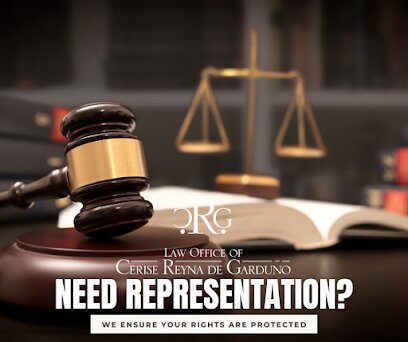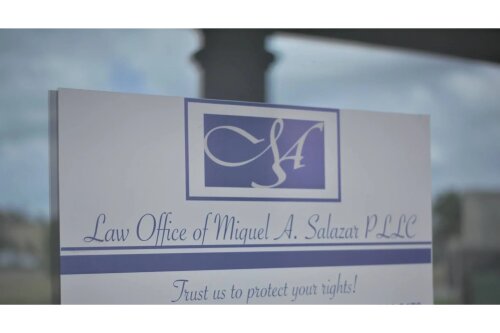Best Child Custody Lawyers in Brownsville
Share your needs with us, get contacted by law firms.
Free. Takes 2 min.
Free Guide to Hiring a Family Lawyer
List of the best lawyers in Brownsville, United States
About Child Custody Law in Brownsville, United States
Child custody matters in Brownsville are governed primarily by Texas state law and handled in the family courts of Cameron County. In Texas the legal framework uses terms like "conservatorship" and "possession and access" instead of the older terms "legal custody" and "physical custody." Courts decide custody based on the best interest of the child. Local courts, child protective agencies, and the Office of the Attorney General play central roles when custody, support, or child safety issues arise.
Why You May Need a Lawyer
Child custody issues are often emotionally charged and legally complex. A lawyer can help protect your parental rights, explain how state law applies to your situation, and guide you through court procedures. Common situations where legal help is important include:
- Contested custody disputes where parents disagree about who the child should live with or how decisions will be made.
- Allegations of abuse, neglect, substance misuse, or domestic violence that affect custody or involvement of child protective services.
- Cases that require paternity establishment before custody or support orders can be entered.
- Relocation or international travel plans that could limit the other parent’s access to the child.
- Modification or enforcement of existing custody or visitation orders, including denials of visitation or violations of court orders.
- Interstate or international custody conflicts, including potential Hague Convention issues or enforcement of out-of-state orders.
- Situations involving military service, immigration complications, or complex family structures such as same-sex parents or guardianship requests.
Local Laws Overview
Key aspects of Texas law and local practice in Brownsville to keep in mind:
- Legal terminology: Texas uses "conservatorship" to describe parental rights and duties. The court may name one or both parents as joint managing conservators or grant one parent exclusive rights in limited circumstances.
- Best interest standard: Courts evaluate the child's best interest using a variety of factors including the child’s physical and emotional needs, parental abilities, stability, any history of family violence, the child's preferences when appropriate, and the parent-child relationship.
- Possession and access: Physical possession and visitation schedules are often governed by the Texas Standard Possession Order when parents do not have a different agreement. Parents may agree to customized schedules that better fit their family's needs.
- Paternity: Unmarried fathers generally must establish paternity before seeking conservatorship or possession rights. Paternity can be established voluntarily or through the court using genetic testing.
- Emergency and temporary orders: Courts can issue temporary orders for custody, protection, or possession while a case is pending, including emergency relief if the child's safety is in immediate danger.
- Child support and enforcement: Child support matters are administered and enforced by the Texas Office of the Attorney General. Support orders and custody orders are separate but often related.
- Protective services: The Texas Department of Family and Protective Services investigates abuse and neglect reports. Cases involving DFPS can result in separate proceedings that affect custody and parental rights.
- Local practice: Custody cases in Brownsville are processed through Cameron County courts. Many cases require mediation, parenting classes, or evaluations. Local judges and family court staff will apply Texas law while considering the particulars of the child and family.
Frequently Asked Questions
What is the difference between conservatorship and possession?
Conservatorship refers to the legal rights and duties of a parent - who makes decisions about the child’s education, health care, and religion. Possession refers to physical custody - where the child lives and when each parent has time with the child. Both concepts are addressed by the court when deciding custody cases.
How does the court decide what is in the child's best interest?
Courts consider many factors such as the child’s age and needs, the emotional and physical stability of each parent, the parent-child relationship, any history of family violence or substance abuse, and, when appropriate, the child’s preferences. The specific factors come from the Texas Family Code and judicial practice.
Do I need to establish paternity to get custody or visitation?
Yes. If parents were not married when the child was born, paternity typically must be legally established before a father can request conservatorship, possession, or support. Paternity can be acknowledged voluntarily or proven through DNA testing ordered by the court.
Can grandparents get custody or visitation?
Grandparents may seek visitation or, in some cases, custody or guardianship, but the court’s primary consideration is the child’s best interest. Grandparents may face higher legal standards to overcome a fit parent’s rights. Specific circumstances such as parental incapacity or termination of parental rights change how courts consider grandparent petitions.
What should I do if the other parent is not following a custody order?
If the other parent violates a court order, keep records of the violations - dates, times, communication, and any witnesses. Attempt to resolve the issue through communication or mediation if safe to do so. If that fails, you can return to court to ask for enforcement, which may include make-up visitation, fines, or other remedies.
Can custody orders be changed later on?
Yes. Custody orders can be modified if there has been a material and substantial change in circumstances affecting the child’s welfare or when modification is in the child's best interest. Common reasons include relocation, changes in a parent’s work schedule, parental substance abuse, or changes in the child’s needs.
What happens if child protective services get involved?
If DFPS investigates abuse or neglect, there may be an administrative or juvenile court case separate from a private custody suit. DFPS involvement can lead to temporary removal, services for the family, or termination proceedings in severe cases. Consult a lawyer immediately if DFPS is involved.
Is mediation required in Brownsville custody cases?
Many Texas courts encourage or require mediation before trial for family law disputes to help parents reach agreements without a contested hearing. Mediation is often required for issues like possession or access unless there is a history of family violence or other safety concerns that make mediation unsafe.
Can I relocate with my child if the other parent has visitation rights?
Relocation that significantly impairs the other parent’s possession or access usually requires either the other parent’s agreement or a court order permitting the move. The court will weigh the reason for relocation against the impact on the other parent’s relationship with the child and the child’s best interest.
How long does a custody case typically take?
Timeframes vary widely depending on whether the case is contested, whether temporary orders are needed, and court schedules. An uncontested case with agreement can be resolved in a few weeks to a few months. Contested cases that require hearings, evaluations, and discovery can take many months or longer. Emergency matters can be resolved much faster if a child's safety is at risk.
Additional Resources
Organizations and agencies that can help people in Brownsville with child custody issues include local courts and county offices, state agencies, and nonprofit legal services. Useful resources to contact or research are:
- Cameron County District Clerk or family court clerk for filing information and case schedules.
- Texas Family Code for the statutory law governing conservatorship, possession, and child support.
- Texas Department of Family and Protective Services for reports of abuse or neglect and services.
- Texas Office of the Attorney General - Child Support Division for support establishment and enforcement.
- Local legal aid organizations such as regional legal services that may provide free or low-cost representation based on income and case type.
- State Bar of Texas lawyer referral services or the local Brownsville Bar Association for attorney referrals and information about family law attorneys.
- Courtappointed mediators, mental health professionals, and court-approved custody evaluators in Cameron County for evaluations and mediation.
Next Steps
If you need legal assistance with child custody in Brownsville, consider these steps:
- Gather documentation: birth certificates, school and medical records, any court orders, communication records, and evidence relevant to safety or parental fitness.
- Establish paternity if necessary: take steps to legally establish parentage before pursuing conservatorship or support rights.
- Seek legal advice: consult a family law attorney for a case assessment. Ask about experience with Cameron County courts and Texas custody law, costs, likely timelines, and possible outcomes.
- Consider mediation or negotiation: if safe and appropriate, a negotiated parenting plan can save time, money, and emotional strain compared to a contested trial.
- File necessary paperwork: if negotiation is not possible or safe, work with an attorney to file a Suit Affecting the Parent-Child Relationship and request temporary orders if you need immediate relief.
- Keep records and follow orders: maintain detailed records of parenting time and communications, and comply with temporary and final court orders while pursuing your case.
- Act quickly in emergencies: if a child is in immediate danger, contact law enforcement and child protective services, and seek emergency court orders through an attorney.
Child custody matters are important and consequential. Getting informed early, collecting evidence, and working with experienced local counsel will help you protect your child’s best interests and your parental rights.
Lawzana helps you find the best lawyers and law firms in Brownsville through a curated and pre-screened list of qualified legal professionals. Our platform offers rankings and detailed profiles of attorneys and law firms, allowing you to compare based on practice areas, including Child Custody, experience, and client feedback.
Each profile includes a description of the firm's areas of practice, client reviews, team members and partners, year of establishment, spoken languages, office locations, contact information, social media presence, and any published articles or resources. Most firms on our platform speak English and are experienced in both local and international legal matters.
Get a quote from top-rated law firms in Brownsville, United States — quickly, securely, and without unnecessary hassle.
Disclaimer:
The information provided on this page is for general informational purposes only and does not constitute legal advice. While we strive to ensure the accuracy and relevance of the content, legal information may change over time, and interpretations of the law can vary. You should always consult with a qualified legal professional for advice specific to your situation.
We disclaim all liability for actions taken or not taken based on the content of this page. If you believe any information is incorrect or outdated, please contact us, and we will review and update it where appropriate.










